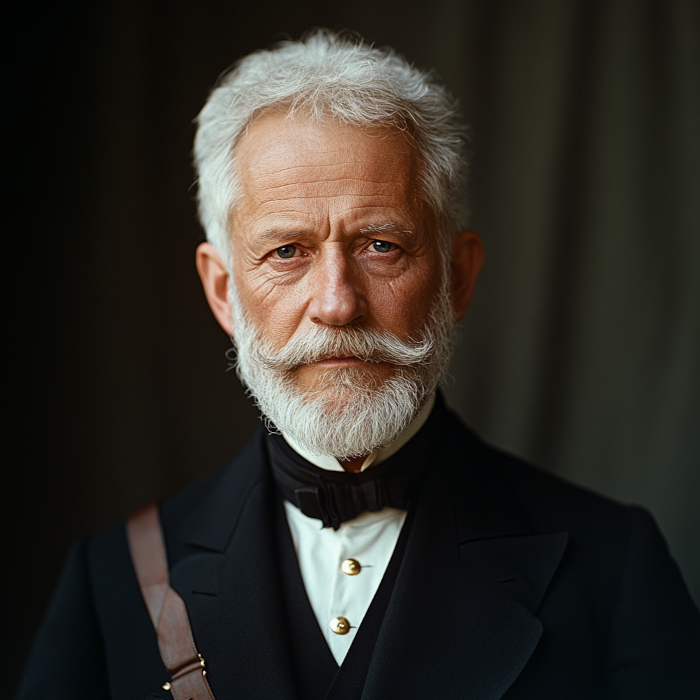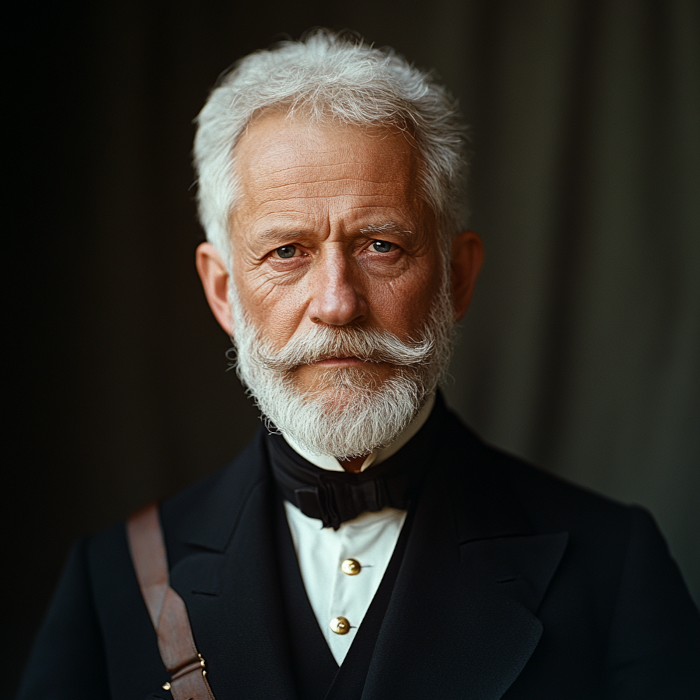


Pyotr Ilyich Tchaikovsky (1840–1893) was a Russian composer of the Romantic era and one of the most famous and influential composers in the history of Western classical music. Tchaikovsky's music is celebrated for its melodic beauty, emotional intensity, and orchestral color. He is best known for his symphonies, operas, concertos, ballets, and orchestral works such as the "1812 Overture", "Swan Lake", "The Nutcracker", and "Romeo and Juliet". His music has had a lasting impact on both Russian and Western classical traditions, blending Western forms with distinctly Russian elements.
Birth and Family Background: Pyotr Ilyich Tchaikovsky was born on May 7, 1840, in Votkinsk, in the Russian Empire, into a middle-class family. His father, Ilya Petrovich Tchaikovsky, was an engineer and worked as the director of a metal works, while his mother, Alexandra Andreyevna, was of French and German descent. Tchaikovsky displayed a fascination with music from an early age, and by the age of five, he was already proficient in playing the piano.
Early Education: Despite his early passion for music, Tchaikovsky's parents sent him to the Imperial School of Jurisprudence in Saint Petersburg to prepare for a career in government service. He studied there from 1850 to 1859 and subsequently worked as a clerk in the Ministry of Justice for several years. However, Tchaikovsky found bureaucratic work unfulfilling and continued to pursue his love of music in his free time.
Formal Music Education: In 1862, Tchaikovsky entered the newly established Saint Petersburg Conservatory, where he studied music theory and composition under Anton Rubinstein, a leading figure in Russian music at the time. This formal training provided Tchaikovsky with a strong foundation in Western classical music techniques, which distinguished him from many of his contemporaries, who were largely self-taught.
Move to Moscow and Teaching Career: In 1866, Tchaikovsky was invited by Nikolai Rubinstein (Anton Rubinstein's brother) to become a professor of music theory at the Moscow Conservatory. He accepted the position and moved to Moscow, where he began composing more seriously. During this period, Tchaikovsky wrote his First Symphony (1866) and his First String Quartet (1871), which gained him recognition as a promising young composer.
Musical Style and Influences: Tchaikovsky's musical style combined Western European traditions with Russian influences, making his compositions uniquely expressive. He drew inspiration from Franz Liszt, Richard Wagner, Mikhail Glinka, and Robert Schumann. Tchaikovsky's music was characterized by lyrical melodies, emotional intensity, and a rich use of orchestration. He was also influenced by Russian folk music and sought to incorporate elements of Russian culture into his works, creating a distinctive national character.
Romeo and Juliet (1869, revised 1880): One of Tchaikovsky's early successes was the "Romeo and Juliet Fantasy Overture", first composed in 1869 and later revised in 1880. The piece is a symphonic poem based on Shakespeare's tragedy and is notable for its lush orchestration and the famous love theme, which has become one of Tchaikovsky's most recognizable melodies. This work showcased Tchaikovsky's ability to convey deep emotion through music and remains one of his most popular pieces.
Swan Lake (1876): "Swan Lake", composed in 1876, was Tchaikovsky's first ballet and remains one of the most beloved ballets in the classical repertoire. Although the original production was not well received, later performances helped establish its lasting popularity. "Swan Lake" tells the story of Princess Odette, who is turned into a swan by an evil sorcerer's curse. The music, with its sweeping melodies and evocative themes, became iconic and helped set the standard for ballet music.
Symphony No. 4 (1877–1878): Tchaikovsky's Symphony No. 4 in F minor was composed between 1877 and 1878 during a period of emotional turmoil. The symphony is dedicated to his patron and confidante, Nadezhda von Meck, who provided financial support and moral encouragement to Tchaikovsky for several years. The work reflects the themes of fate and personal struggle, with a dramatic opening fanfare symbolizing the inescapability of fate. The symphony was well received and remains one of Tchaikovsky's most frequently performed works.
Eugene Onegin (1879): "Eugene Onegin", composed in 1879, is an opera based on Alexander Pushkin's novel in verse of the same name. The opera tells the story of the unfulfilled love between Tatyana and the aloof aristocrat Onegin. It is notable for its intimate character development and Tchaikovsky's ability to capture the emotional depth of Pushkin's characters. "Eugene Onegin" became one of Tchaikovsky's most beloved operas and is a staple of the Russian operatic repertoire.
The Nutcracker (1892): "The Nutcracker", composed in 1892, is perhaps Tchaikovsky's most famous ballet. It is based on E.T.A. Hoffmann's story "The Nutcracker and the Mouse King" and tells the tale of a young girl named Clara who is transported to a magical world on Christmas Eve. The ballet includes some of Tchaikovsky's most recognizable music, including the "Dance of the Sugar Plum Fairy" and the "Waltz of the Flowers". "The Nutcracker" has become a Christmas tradition in many parts of the world and is celebrated for its enchanting melodies and orchestration.
Symphony No. 6 "Pathétique" (1893): Tchaikovsky's Symphony No. 6 in B minor, Op. 74, known as the "Pathétique", was his final completed work and is often considered his masterpiece. The symphony premiered on October 28, 1893, just nine days before Tchaikovsky's death. It is a deeply emotional work that explores themes of suffering, despair, and resignation. The final movement, which ends with a quiet and haunting Adagio lamentoso, is particularly poignant and is often interpreted as a reflection of Tchaikovsky's personal struggles.
Homosexuality and Emotional Turmoil: Tchaikovsky's personal life was marked by emotional turmoil and struggles related to his sexuality. He was a closeted homosexual at a time when homosexuality was not only socially taboo but also illegal in Russia. The pressure to conform to societal norms led to significant distress throughout his life. In 1877, Tchaikovsky entered into a short and disastrous marriage with Antonina Miliukova, a former student who had written him passionate love letters. The marriage, undertaken partly to quell rumors about his sexuality, lasted only a few weeks and plunged Tchaikovsky into a deep depression.
Relationship with Nadezhda von Meck: One of the most significant relationships in Tchaikovsky's life was his correspondence with Nadezhda von Meck, a wealthy widow and music lover who became his patron. Von Meck provided Tchaikovsky with financial support for more than a decade, allowing him the freedom to focus on his composing. They corresponded regularly for years but never met in person. Their letters reveal a deep intellectual and emotional connection, and von Meck's support was crucial to Tchaikovsky's success as a composer.
European Tours and Recognition: In the late 1880s, Tchaikovsky gained recognition not only in Russia but also across Europe. He traveled extensively, conducting his works in major cities such as Paris, London, and Berlin. In 1891, he visited the United States, where he conducted at the opening of Carnegie Hall in New York City. By this time, Tchaikovsky was regarded as one of the most important composers of his era, and his works were performed around the world.
Death (1893): Tchaikovsky died on November 6, 1893, in Saint Petersburg, under circumstances that remain somewhat controversial. The official cause of death was cholera, contracted after drinking contaminated water. However, there have been persistent rumors that Tchaikovsky may have taken his own life, possibly due to the immense social pressure related to his sexuality or other personal struggles. Regardless of the exact cause, his death was a tragic loss for the world of music, occurring just days after the premiere of his Symphony No. 6.
Master of Melody and Emotional Expression: Tchaikovsky is celebrated as one of the greatest composers of the Romantic era, known for his ability to craft memorable melodies and evoke deep emotional responses through his music. His works often explore themes of love, fate, suffering, and triumph, and his music's emotional immediacy continues to resonate with audiences today. His ballet scores, in particular, helped redefine the genre, turning it into a vehicle for musical and dramatic storytelling.
Contribution to Ballet Music: Tchaikovsky’s ballets—"Swan Lake", "The Sleeping Beauty", and "The Nutcracker"—are among his most enduring contributions to classical music. His use of richly orchestrated music to convey the story's emotional depth and character development transformed ballet music, elevating it from mere dance accompaniment to a central artistic element. His ballets remain a central part of the repertoire and are performed by ballet companies worldwide.
Russian Nationalism and Western Influence: Tchaikovsky’s music reflects a blend of Western European classical traditions and Russian nationalism, a synthesis that set him apart from other Russian composers of his time, such as the Mighty Five (which included composers like Modest Mussorgsky and Nikolai Rimsky-Korsakov). Unlike the Mighty Five, who sought to create a uniquely Russian style, Tchaikovsky embraced Western forms such as the symphony, concerto, and ballet. His ability to blend these influences helped establish Russian music on the international stage.
Influence on Future Generations: Tchaikovsky’s music had a profound influence on later composers, both in Russia and internationally. His symphonies and concertos influenced composers such as Sergei Rachmaninoff and Dmitri Shostakovich, while his orchestration techniques inspired many others. His works remain staples of the concert repertoire, and his ballets are beloved by audiences around the world.
Pyotr Ilyich Tchaikovsky was a composer of extraordinary talent and emotional depth whose music has left an indelible mark on the history of classical music. His symphonies, ballets, operas, and concertos are celebrated for their lyrical beauty, dramatic expression, and rich orchestration. Despite his personal struggles and the societal challenges he faced, Tchaikovsky produced some of the most beloved works of the Romantic era, works that continue to captivate and inspire audiences to this day.
Tchaikovsky's ability to blend Russian folk elements with Western classical forms created a body of work that is both uniquely Russian and universally appealing. His contributions to ballet music, in particular, have made him one of the most recognizable and influential composers in the genre. His music, filled with passion, poignancy, and beauty, ensures his enduring legacy as one of the greatest composers in the history of Western classical music.

We use cookies
We use cookies and other tracking technologies to improve your browsing experience on our website, to show you personalized content and targeted ads, to analyze our website traffic, and to understand where our visitors are coming from. Privacy Policy.